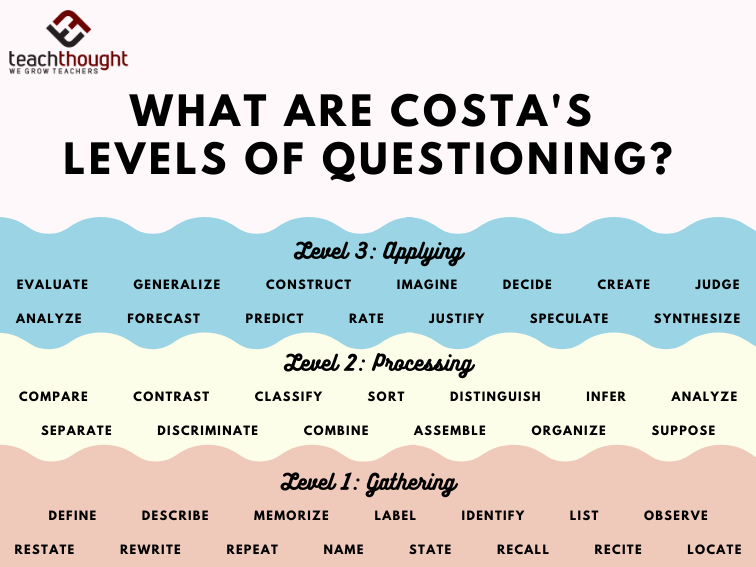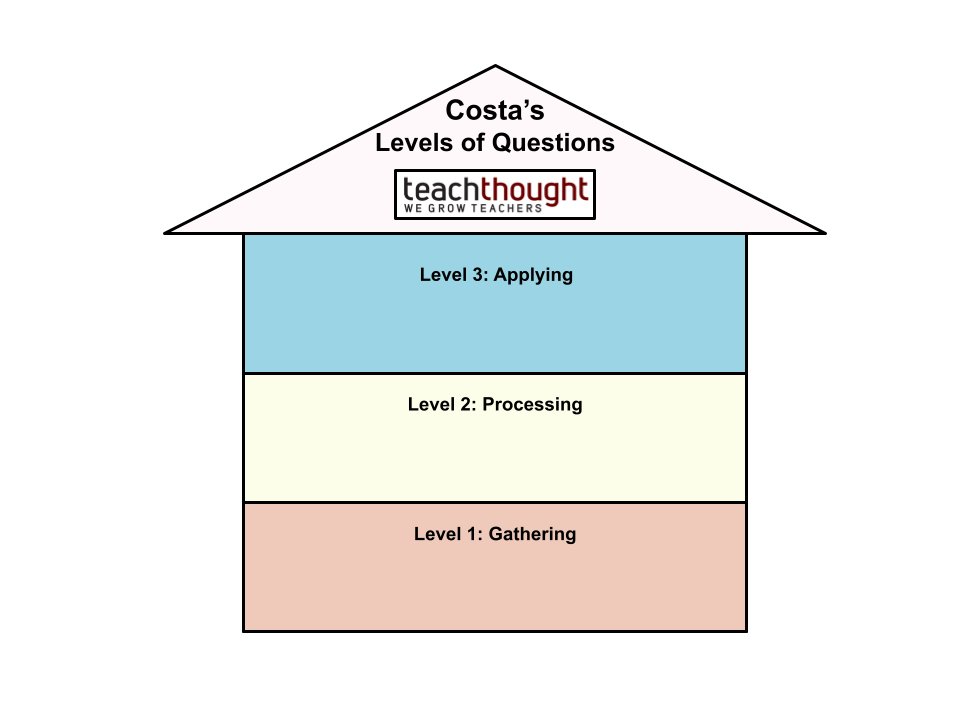

Costa’s Degrees of Questioning– created by instructional researcher Art Costa– include 3 rates of questioning created to promote higher-level thinking and questions.
Comparable to Blossom’s taxonomy , Costa’s lower degree motivates trainees to use even more standard faculties; as trainees go up in degrees, the questions motivate them to make use of even more complicated thinking abilities. With decades of research study on human durability, Dr. Costa additionally determined the 16 Routines of Mind , a collection of behaviors that support pupils in navigating the difficulties that often occur in college and life, as a whole. Several of Dr. Costa’s 16 routines– believing interdependently, innovating, gathering information, and using past expertise to brand-new scenarios– both call for and strengthen greater levels of doubting.
There is a substantive quantity of research that sustains Dr. Costa’s schema. Newmann (1993 discovered that higher-order assuming compels trainees to “control information and concepts in manner ins which transform their definition,” and “expects trainees to solve problems and create suggesting on their own,” which aligns with a constructivist sight of education and learning
Costa’s Levels of Examining are normally shown making use of the metaphor of a home with three floorings:


Degree 1: Collecting
Degree 1 concerns mostly call for pupils to collaborate with information ‘on the web page.’ Response to level 1 questions are normally actual; meaning, a student can literally indicate the solution on a web page.
We have actually formerly covered Blossom’s Taxonomy power verbs , so you can forecast that Costa’s levels have their very own set of power verbs, as well. Right here are a couple of that you might locate at the beginning of Level 1 inquiries:
- Define
- Explain
- Memorize
- Tag
- Identify
- Checklist
- Observe
- Restate
- Revise
- Repeat
- Call
- State
- Remember
- State
- Find
- Select
- Match
- Program
Degree 1 inquiries by material area could appear like these instances:
- Scientific research : Label the components of an animal cell.
- Math : Recite the formula for discovering the volume of a cylinder.
- Social Studies : Match the name of the queen to their respective nation.
- English Language Arts : Situate the place in the story where the climax takes place.
You can see how the majority of these Degree 1 power verbs call for trainees to remember information, which is an important skill in its very own right. Nevertheless, educators should pursue the majority of their inquiries to drop in Level 2 or 3, which challenge students to use higher-order reasoning skills.
Degree 2: Handling
Level 2 concerns go an action additionally than Level 1, triggering trainees to refine details by ‘reading between the lines.’ While pupils might need to use literal info to create their responses, Level 2 needs them to process that details with what they currently understand in order to make new connections.
Below are some instances of Level 2 power verbs:
- Contrast
- Comparison
- Categorize
- Sort
- Distinguish
- Presume
- Examine
- Separate
- Discriminate
- Integrate
- Put together
- Organize
- Suppose
Level 2 inquiries by content area may turn up in the following methods:
- Scientific research : Contrast the procedures of mitosis and meiosis.
- Math : Categorize the geometric forms according to their number of sides and angles.
- Social Studies : Assemble the adhering to historic occasions in the order of value, from most to the very least.
- English Language Arts : Analy ze the effect that the author’s tone has on the general definition of the message.
Can you see how Degree 2 questions go a step additionally than Degree 1 Greater than simply regurgitating information, learners take it and ‘do something’ with it. They classify, make differences, and compare/contrast it versus another part to see exactly how it influences the entire. These sort of skills can promote curiosity and build a bridge to the questions that truly generate creative thinking and higher-level thinking.
Degree 3: Using
While Degree 1 inquiries prompt pupils to deal with input, and Degree 2 questions challenge them to process that input in order to make brand-new connections. Right here, students take part in the highest-level reasoning skills to produce an outcome. This can result from making assessments and evaluations, testing solutions to different issues, or making predictions.
We have actually included some examples of Degree 3 power verbs listed below:
- Review
- Generalize
- Create
- Think of
- Decide
- Develop
- Judge
- Assess
- Forecast
- If/then
- Forecast
- Rate
- Warrant
- Guess
- Synthesize
- Construct
- Hypothesize
Level 3 inquiries by material location might resemble the following:
- Scientific research : Based on information from the last decade of typhoon task in the southeast united state, predict just how the frequency of storm activity will transform in the next 10 years.
- Math : Price the likelihood of a presidential prospect winning the political election based on securing the electoral ballots from the adhering to U.S. states: Florida, The Golden State, Virginia, New York City, Illinois.
- Social Studies : Create a social compact that thinks about the results of globalization and technical improvement in the 21 st century.
- English Language Arts : Build a disagreement that safeguards or refutes required worker inoculation plans in the USA.
Whether preparing for discussion-based tasks, project-based understanding, or independent questions, instructors need to strive to orient most of pupil thinking and engagement at Levels 2 and 3 Assessments that prompt students to recall standard facts (such as the day of a historical occasion, or the name of a writer, or the formula for a formula) do not truly analyze trainees’ ability to apply new skills or info to brand-new contexts. A Level 2 or 3 question would test students to make links with standard info. As an example, as opposed to recalling a plain day, a more flexible question would ask students to anticipate, based on the time in background that a specific event occurred, the chance of it persisting, offered a similar sociopolitical atmosphere. Along the exact same lines, rather than remembering the names of well-known writers, an educator could test trainees to make a debate for how an author would certainly discuss a certain modern-day concern.
In “A Talk to Educators,” James Baldwin defined the mystery of education: “As one starts to become mindful, one starts to analyze the culture in which [they] are educated.” Degree 2 (and mainly, degree 3 inquiries intend to cultivate this type of response in trainees, to cause them to tilt their heads, do double-takes, mention disparities, interfere with the status, identify problems in present establishments, and produce cutting-edge services for those defects. These are the concerns that inspire us to find up with more questions, to think of our reasoning, and to develop– both as people and societies.